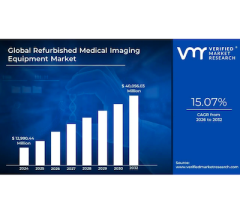
Getty Images
December 9, 2021 — The American Society for Radiation Oncology (ASTRO) issued the following statement from ASTRO Board of Directors Chair Laura A. Dawson, M.D., FASTRO, in response to today's introduction of the Supporting Health Care Providers During the COVID-19 Pandemic Act in the U.S. House of Representatives. The bill includes a provision to delay the start of the Centers for Medicare and Medicaid Services' (CMS) Radiation Oncology Alternative Payment Model (RO Model) until January 1, 2023.
"Radiation oncologists across the country applaud our congressional champions for working to protect patient access to cancer care during this pandemic by implementing a one-year delay to the RO Model and mitigating serious Medicare payment cuts. We urge Congress to pass this legislation before year-end. While we are grateful for the delay, our focus remains on the reforms needed for the model to be successful.
We continue to support a transition to value-based care, but the current CMS model needs urgent reforms to achieve that goal. Excessive cuts to radiation oncology reimbursement will force many clinics to reduce services or close, threatening patient access to life-saving cancer treatments. Worse, the impact of these cuts will have a disproportionately negative impact on clinics that treat patients from populations already underserved by the health care system.
This delay creates a critical window of opportunity for Congress to address the RO Model’s flaws, namely the excessively severe discount factor payment cuts, as well as the need for payment stability for all radiation oncology clinics. We are pleased by the momentum building in support of these legislative reforms, and we look forward to working with our congressional champions to address these issues early in the new year."
Medicare cuts to radiation oncology are among the highest of any medical specialty for next year, and they are part of a more-than-20% cumulative drop in reimbursement to radiation oncology over the past decade. Moreover, cuts come as the cancer community continues to bear the impact of the COVID-19 pandemic. An ASTRO physician survey found that the pandemic led to delayed cancer screenings and diagnoses, and that as a result, a large percentage of radiation oncologists now care for patients with more advanced cancers that require more intensive treatments. As representative Kim Schrier, MD (D-Wash.), who co-sponsored the bill with Steven Horsford (D-Nev.), said in a press release about the legislation, "A pandemic is not the time to be cutting access to doctors for patients on Medicare."
More than 100 bipartisan members of Congress wrote the Biden administration earlier this fall objecting to the excessive radiation therapy payment cuts under the RO Model and Medicare's 2022 fee schedule. Led by representatives Brian Fitzpatrick (R-Pa.) and Brian Higgins (D-N.Y.) (view the House members' letter here); senators Debbie Stabenow (D-Mich.) and Richard Burr (R-N.C.) (view the Senate members' letter here); and representatives Tony Cárdenas (D-Calif.) and Bobby Rush (D-Ill.) (view the letter from members of the Congressional Black Caucus, Congressional Hispanic Caucus, Congressional Asian Pacific American Caucus and Congressional Native American Caucus here), the letters emphasized that patients will suffer the impact of severe Medicare cuts to cancer treatments. The cuts, they said, "could have chilling effects on patient access to life-saving care" and would "disproportionately impact vulnerable communities that already face poor access to cancer screening and care."
Led by ASTRO, the radiation oncology stakeholder community has consistently expressed concerns that the CMS model falls short of what is needed to achieve the promise of an alternative payment model for radiation oncology. "ASTRO has outlined specific changes to the model that would incentivize high-quality care while still generating savings for Medicare," said Dr. Dawson. "With significant modifications, the RO Model could represent a meaningful approach for radiation oncology to participate in the evolving world of health care payment reform. Delaying the model until 2023 provides time for Congress to work with radiation oncology stakeholders to ensure the model's success and protect patient access to cancer care."
For more information: www.astro.org


 February 04, 2026
February 04, 2026 









